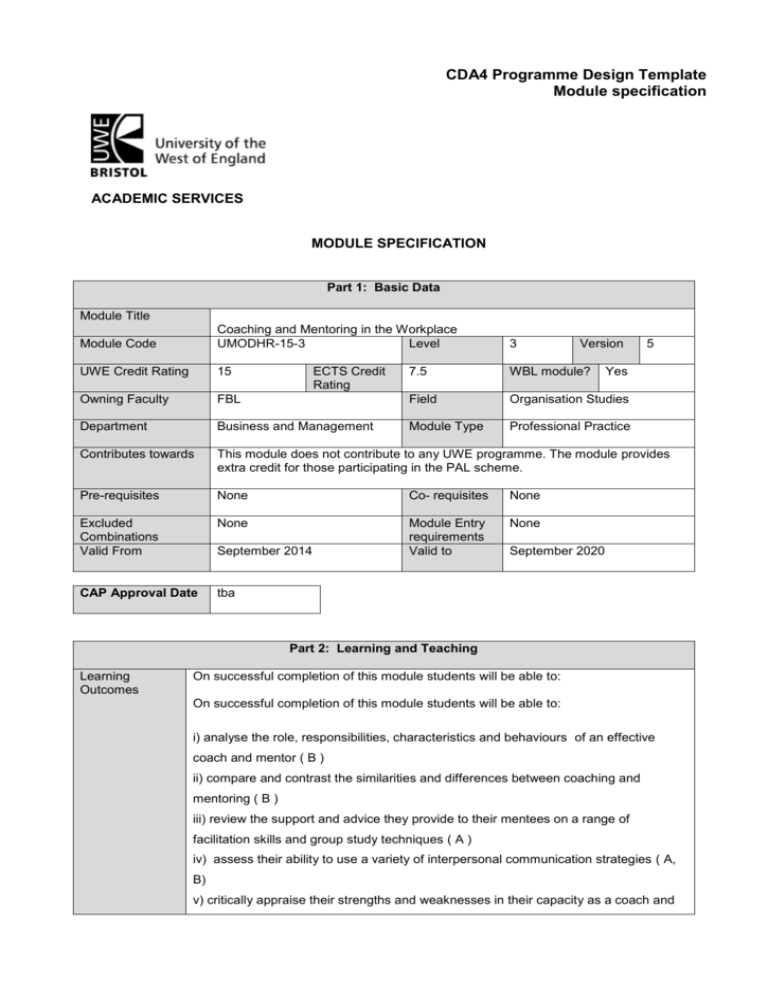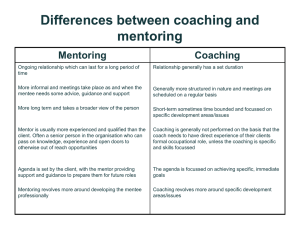Coaching and Mentoring module specification
advertisement

CDA4 Programme Design Template Module specification ACADEMIC SERVICES MODULE SPECIFICATION Part 1: Basic Data Module Title Module Code Coaching and Mentoring in the Workplace UMODHR-15-3 Level 3 UWE Credit Rating 15 7.5 WBL module? Owning Faculty FBL Field Organisation Studies Department Business and Management Module Type Professional Practice Contributes towards This module does not contribute to any UWE programme. The module provides extra credit for those participating in the PAL scheme. Pre-requisites None Co- requisites None Excluded Combinations Valid From None Module Entry requirements Valid to None CAP Approval Date tba ECTS Credit Rating September 2014 Version 5 Yes September 2020 Part 2: Learning and Teaching Learning Outcomes On successful completion of this module students will be able to: On successful completion of this module students will be able to: i) analyse the role, responsibilities, characteristics and behaviours of an effective coach and mentor ( B ) ii) compare and contrast the similarities and differences between coaching and mentoring ( B ) iii) review the support and advice they provide to their mentees on a range of facilitation skills and group study techniques ( A ) iv) assess their ability to use a variety of interpersonal communication strategies ( A, B) v) critically appraise their strengths and weaknesses in their capacity as a coach and mentor ( A, B ) Syllabus Outline This module is designed to allow final year students to develop a deeper understanding of the coaching and mentoring process. The students will be working closely with the PAL Office team who will guide them in developing their work based coaching and mentoring diaries. The student’s diaries will contain recordings of mentor-mentee meetings, action plans, together with reflection and critical evaluation of their practice as a coach/mentor to students in the years below. Particular emphasis will be given to the following topics: • The context and case for coaching and mentoring in organisations • Skills and good practice in coach-mentoring • The GROW coach-mentoring framework • Group and one-to-one peer group supervision • Learning, learning styles and barriers to learning • Tools and strategies for work and personal development • Personal values analysis and career drivers • Maintaining organisation quality assurance standards • Personalising evaluation, observing and giving feedback Contact Hours PAL Office meetings: 10 Directed Leaning (D): 50 Summative Assessment (C): 10 Self-directed learning: 80 Total: 150 hours Teaching and Learning Methods The module is building on the students’ own work experience during their time as a coach. It is supported by the Peer Assisted Learning Office through initial and followup training workshops and regular group plenary sessions. The training programme will focus on enabling the students to achieve the learning outcomes while carrying out their roles as coaches and mentors. Additionally, the PAL Office staff will carry out formal observations on at least two occasions and formally advise, guide and assess the students' performance as mentors. The basis of learning and support within the module is a series of meetings, since many of the learning outcomes for the module can be met through the students’ reflective diaries. The main areas of support for the students will come from the University's PAL Office staff and students’ peer group. The students’ portfolio will contain a collection of documents through which the students record, reflect on, critically evaluate and demonstrate their development as a coach/ mentor over a sustained period. The students are expected to be constructing their portfolio concurrently while undertaking their activities as PAL coaches. In particular it will enable students to: - display a collection of examples of what they actually do as PAL coaches; - show their thinking behind their approach to their coaching/mentoring related activities; - include reflective accounts which highlight what is unique about their approach to their role as a coach/mentor; - demonstrate a gradual unfolding and development of their expertise in planning and reviewing their mentoring sessions and in applying a range of techniques while running their sessions. Key Information Sets Information Key Information Set - Module data Numb er of credits for this module Hours to be allocated 150 15 Scheduled Independent Placement learning and study hours study hours teaching study hours 36 114 0 Allocated Hours 150 The table below indicates as a percentage the total assessment of the module which constitutes a Written Exam: Unseen written exam, open book written exam, In-class test Coursework: Written assignment or essay, report, dissertation, portfolio, project Practical Exam: Oral Assessment and/or presentation, practical skills assessment, practical exam Please note that this is the total of various types of assessment and will not necessarily reflect the component and module weightings in the Assessment section of this module description: Total assessment of the module: Written exam assessment percentage 0% Coursework assessment percentage 100% Practical exam assessment percentage 0% 100% Reading Strategy There are no set texts for this module. Students will be encouraged to identify reading relevant to the peer learning and mentoring activities. Literature searching skills will be supported by library services and additional support given using the library interactive tutorials and subject specific guidance on the module website. Support for identifying appropriate and relevant sources will be provided by the PAL Office staff. It is expected that the references and bibliography included in their diaries reflect their range of reading. Guidance will be provided through examples of previous submissions and module materials providing support for evaluating appropriateness and validity. Indicative Reading List The following list is offered to provide validation panels/accrediting bodies with an indication of the type and level of information students may be expected to consult. As such, its currency may wane during the life span of the module specification. However, as indicated above, CURRENT advice on readings will be available via other more frequently updated mechanisms. Hawkins P. Smith N., 2006. Coaching Mentoring and Organisational Consultancy. Open University Press, London. Clutterbuck D and Ragins BR., 2002 Mentoring and Diversity. An International Perspective. Butterworth Heinemann, Oxford. Parslow E. And Wray M., 2000. Coaching and Mentoring : practical methods to improve learning. Konan Page, London Downey M., 1999. Effective Coaching. Texere, London. Useful Resources Association for Coaching: www.associationcoaching.org International Coach Federation: www.coachfederation.org.uk Coaching and Mentoring Network: www.coachingnetwork.org.uk The Mentor Directory: www.peer.ca/mentor Part 3: Assessment Assessment Strategy Component A: The work based portfolio provides evidence of the one-to-one and group coaching and mentoring activities the candidates undertake. To successfully pass this element candidates have to complete a minimum of 6 coaching contact hours as required on the course coaching meeting and feedback form. Students can use one hour for peer coaching purposes. Component B: This element is assessed via a reflective report based on the portfolio evidence provided in component A. Identify final assessment component and element % weighting between components A and B (Standard modules only) A: P/F B: 100 First Sit Component A (controlled conditions) Description of each element 1. Work based portfolio of evidence ( pass/fail) Component B Description of each element 1. Reflective Report based on portfolio evidence 1500 – 2000 words Element weighting (as % of component) P/F Element weighting (as % of component) 100% Resit (further attendance at taught classes is not required) Component A (controlled conditions) Description of each element 1. Work based portfolio of evidence (Pass/Fail) Component B Description of each element 1. Reflective Report based on portfolio evidence 1500 – 2000 words Element weighting (as % of component) P/F Element weighting (as % of component) 100% If a student is permitted a retake of the module under the University Regulations and Procedures, the assessment will be that indicated by the Module Description at the time that retake commences.





